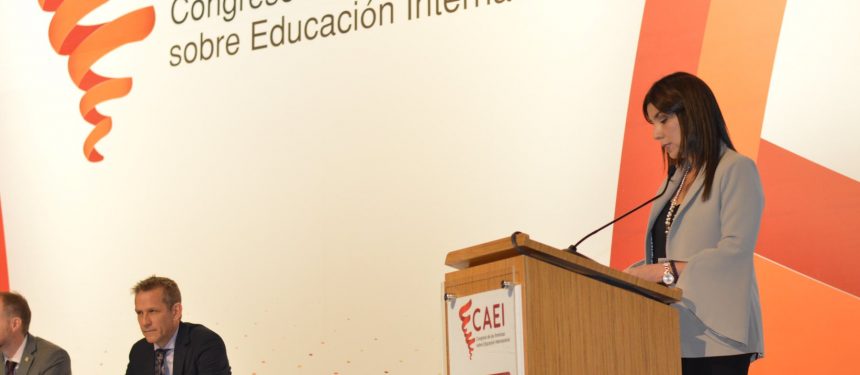With a record-breaking 950 delegates from 36 countries brought together over three days to explore opportunities for mobility and strategic collaboration, the 2019 Conference of the Americas on International Education was set to be, as CAEI executive director David Julien suggested, “a gamechanger” for mobility in the Americas.
News and business analysis for Professionals in International Education
Have some pie!
CAEI 2019: delegates encouraged to recognise the value of mobility closer to home
 Minister of National Education of Colombia, María Victoria Angulo, welcomed delegates and invited them to discuss their perspectives on their shared challenges in education. Photo: CAEI
Minister of National Education of Colombia, María Victoria Angulo, welcomed delegates and invited them to discuss their perspectives on their shared challenges in education. Photo: CAEI Now in its sixth iteration, the biannual gathering welcomed international educators, leaders, ministers and key stakeholders from across the Americas, Asia, Africa, Oceania and Europe – including new delegations from Hungary, Germany and New Zealand – to Bogota, Colombia for discussion and debate centred around the theme of ‘Hubs of Knowledge and Innovation: Synergies for Development’.
“Rather than behaving like singular countries, we all need to come together to discuss the challenges we all face”
The conference also provided an opportunity for expert speakers to present on topics ranging from the impact that technology (the “mother of all megatrends”) will have on learning to Canadian/Latin American cooperation and new approaches such as ‘horizontal partnerships’.
In the opening plenary, the minister of National Education of Colombia, María Victoria Angulo, invited delegates to discuss their perspectives on their shared challenges in education, which she said would “go a long way to helping to reduce disparities” in communities across the Americas.
“But whether we are speaking about the Caribbean or Latin America, we are all doing the same thing, we are all trying to educate our citizens,” added Michael S. Browne, minister of education, science and technology for Antigua and Barbuda.
“So, rather than behaving like singular countries, we all need to come together to discuss the challenges we all face so we can find common strands to address the deficiencies.”
One session that unpicked the topic of ‘international partnerships: strengthening hubs’ also examined the impact that the internationalisation of higher education is having in the current climate and addressed massification as one of the biggest challenges for the sector.
“We are seeing more and more countries wanting to attract international students –Malaysia, Singapore, Russia – while China continues to be an important player, both as a main sending country, and main receiving country,” panellist and director of the Center for International Higher Education at Boston College, Hans de Wit, explained.
“But despite the nice plans being presented, Latin America is not really making words into concrete actions – there is not much collaboration or outward mobility.
“In Latin America, you still look at Europe, Canada, US and a little to Asia, and you don’t collaborate in your region – that is important to strengthen your power,” he added.
De Wit also highlighted the importance of institutions focusing on fostering partnerships away from top-ranked elite universities.
“There are institutions outside of world top 500 doing great work and doing internationalisation in their own way [and] if we nurture them then that is very efficient because the world doesn’t only need top researchers, we need good teachers and good nurses too.”
But for de Wit, it was the noticeable lack of a large number of US delegates at CAEI that was sending the strongest message.
“We are focused on utilising institutions that are good at hosting [international students]”
“Most of developing countries partnerships are with Europe and North America, yet less than 2% of participants here are from the US,” he said.
“But at the same time, so many [Latin American delagates] go to NAFSA – let them come to you instead, while you look at how Bogota can work with São Paulo, for example. Then look further.”
In response, director of the Office of Global Educational Programs at US Department of State, Anthony Koliha, encouraged delegates to continue considering the US as a mobility destination, explaining that one of the top priorities for his office is ensuring that the campuses remain diverse and “open for business”.
“One challenge we have is that for two years in a row, there has been over a million international students in the US, but when we look at statistics, approximately 80% of that number is at top 300 hosting universities meaning thousands of institutions are not benefiting from student mobility,” he said.
“We are focused on expanding domestic outreach, utilising institutions that are good at hosting [international students], and having them share their knowledge with other institutions around them,” he added.
CAEI 2019 also hosted the launch of the QS Latin America university rankings which saw Pontificia Universidad Católica de Chile retain its top spot and the signing of a memorandum of understanding between Colombia Challenge Your Knowledge and the China Education Association for International Exchange.
Closing the conference, Julien described the event as a “success” that had been “enriched by open and frank debates and authentic inter-American cooperation”.
“It’s a sign of the extraordinary potential present in all nations comprising this continent,” he added.
CAEI 2021 will take place in Santiago, Chile.
Still looking? Find by category:


